We were supposed to meet up on Zoom on Wednesday night to talk and make life during COVID a bit easier.
But one month ago, Jerry Gaus, my teacher and friend, passed away.
I’d like to tell you about the man I knew. I will weave together personal and intellectual reflections, for what he thought and how he lived were one.
I. Meeting Jerry
I met Jerry in Fall 2006, during my second year as a graduate student in philosophy at the University of Arizona. My first year hadn’t been easy. My father and grandmother had died shortly before I began the program in 2005, and I had struggled to find my footing. By my second year, I had started to wonder whether I had what it takes to be a philosopher.

Jerry in 2006
That semester, Jerry taught a seminar on Contemporary Theories of Liberalism (based on his 2003 book by the same name). I remember the first day in the seminar room—the excitement of meeting the department’s new senior hire, hoping to connect with someone whose work I admired. Perhaps we’d strike up a friendship. Maybe he’d see something in me that others did not.
In walked a man with long gray hair, wearing a button-up Hawaiian shirt and jeans. (This was Jerry’s uniform and I seldom saw him wear anything different, in fifteen years.) He began by asking the students what we worked on. My friend Chris Freiman and I had a fancy for Aristotle at the time, and when we mentioned this, Jerry smiled, made a cross with his arms … and hissed with a wry grin.[i] This was the first of many times he would make me laugh, sometimes to the point of tears. I will try to give you a feel for his sense of humor by reproducing some of the photos on his website, hilariously named gaus.biz.
Jerry did not really meet anyone’s expectations, but exceeded them. The philosophers who knew Jerry knew his comprehensive brilliance and extreme work ethic. He’s one of the only people I know that I would describe as a genius, and he was among the only geniuses I ever knew who made such a full use of his talents: reading deeply, writing carefully, investing heavily in graduate student after graduate student, designing new curricula, starting new programs, developing the national and international community in philosophy, politics, and economics, and so on. Everything he did was done with intellectual depth and passion.
His seminars were a good example; he would frequently teach new material that was guiding him into a new research program, but he had it mastered to the point where you had to read the material three times before class to keep up with his expectations. And then he’d write an article or book on the matter, and he was several steps ahead of even the other professors who sat in. Jerry was never boring, and never stayed in one place, intellectually. Always forward, always engaging other sets of ideas, always challenging himself to learn new tools. He had taught himself new skills frequently, most recently agent-based computer modeling to help him study complexity theory that will play a central role in his next book.
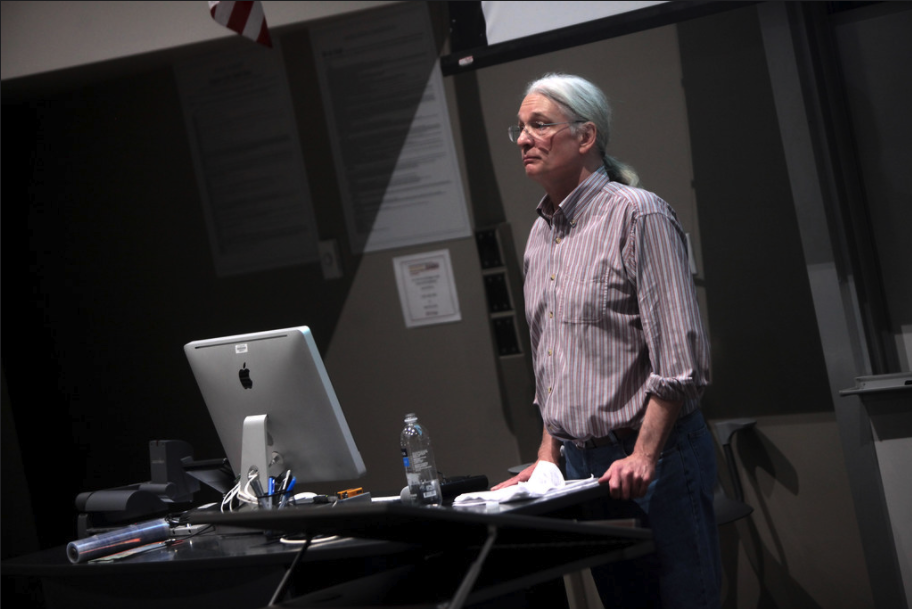
Jerry lecturing in 2014.
But he was more to me than an inspiring teacher. Jerry was merciful, generous, and kind, and in all honesty spared me from professional failure. Over the next five years, I would work closely with Jerry almost every weekday, if not in class, then in his office, or by email. He invested enormous time and energy into my development as a philosopher. My gratitude was profound and my admiration for him had no limit.
Jerry was a demanding advisor, to say the least. He would read my draft papers and fill them with criticisms—almost all of them decisively correct. I’d spend hours revising a paper, only to have him refill it with equally decisive objections. But the process of working through revision after revision was a crucible for me. The more I invested myself in the work of a graduate student, the more of his life he poured into mine. Our constant collaboration drew us closer together, despite the fact that Jerry was a private man. Twice I was overwhelmed with the briefest remarks that he was proud of my work, once after my dissertation defense, and another just last year. He didn’t say such things often, and so I treasure a few hard-earned words as high points in my professional life.
One of the most important things about Jerry is that he chose his friendships very carefully. He was not one to have shallow relationships or to seek out admirers. He was not aiming for academic celebrity. But he inspired intense love and devotion anyway.
I think I can explain how he did this because his corpus explains a lot about the man he was. I’ve spent a lot of time with his work, including work that stretched back into the 1980s. Running through all of it is a theme that few have noted. I’d like to share it with you. These reflections get into the details of his work, but I think you will find reflecting upon them worthwhile.
II. Ideology vs Relationship in Jerry’s Early and Middle Work (1990-2010)
One central theme from Jerry’s work (though not the only one) is the dangerous role that political ideology plays in the destruction of personal relationships. In his first book, Value and Justification (1990), Jerry developed analyses of how persons make value judgments, the nature of the moral emotions and the process of moral maturation. In combination with an account of the norms and goods of personal relationships, he developed an original contractualist moral and political theory, where the norms of moral and political life gain their authority from the fact that each person can see reason of her own to abide by those norms. Jerry argued that the idea of the social contract was natural to humankind because the social contract is a way in which human beings take the perspective of others into account. Our capacity to take the perspective of others into account is part of moral maturity, a form of Jean Piaget’s idea of decentering from our own perspective in deciding how to act. The trouble with so much philosophy is that it only develops moral theory from a kind of first-personal point of view, where we reason from our own perspective alone. The virtue of the great social contract theorists is that they saw how the clash of first-personal points of view placed considerable strain on the formation and maintenance of modern, large-scale cooperative social orders. They realized that we would have to learn to reason together. But Jerry insisted on a relatively optimistic view of human nature which holds that we have the moral equipment, so to speak, to overcome the authoritarianism of the pure first-person perspective and build others’ perspective into our own decision-making. Indeed, he argued that this process of decentering and integration of perspectives was a deep supposition of the kinds of love, friendship, and trust that we value most in life.
Value and Justification fell stillborn from the press. Few of the other social contract theorists paid it much attention, including John Rawls and Tim Scanlon, who would have profited from studying it. But it is extraordinary, and the research was trenchant and tireless (I once counted, and I think it has over seven hundred unique bibliographical entries). The contract theory in that book deserved every bit as much attention as the other contract views in circulation at that time, as Jaime Dreier indicated in his review of the book.[ii] And it was better grounded in the sciences than anything written in the three-hundred-and-fifty-year history of the social contract tradition.
This emphasis on public, social reasoning led to his next great work, Justificatory Liberalism, which was more focused on political philosophy and political institutions than Value and Justification (though the works are in some respects continuous, and can be profitably read as one comprehensive theory of morality and politics). Published in 1996, alongside his good friend Fred D’Agostino’s magisterial Free Public Reason, the “public reason” tradition received its highest level of precision and erudition. Yet too few knew.[iii] Justificatory Liberalism only started to receive careful attention in the mid-2000s, when Jonathan Quong and Micah Schwartzman rediscovered it as graduate students in Oxford. And once Jerry arrived at the University of Arizona, and started having graduate students there, we would write on topics therein. The book is one of intense clarity, insight, and care. It too fell by the wayside in mainstream political philosophy for a time. I know 1996 was late in Rawls’s life, but it’s a shame he couldn’t have engaged with it.

Fred (read Free Public Reason)
You’ll detect in these reflections a bit of regret that Jerry was doing incredible work without due accolades. But this regret wasn’t shared by Jerry himself. I never heard him complain about the reception of his work. He just kept writing on whatever interested him, advancing the field even if its leading and most influential figures barely acknowledged his existence. This was part of his nobility: he loved seeking the truth so much that he had little time for the social niceties of the profession.
That’s because what Jerry really valued in life was close personal relationships of friendship and love, and a fierce pursuit of truth in one’s professional life. Again, he saw complex ideological systems, prominent among philosophers, but also theologians, political scientists, and economists, as manifestations of unjustified pride and a desire to use these questionable systems of ideas to control, browbeat, and harm other people.
Along these lines, Jerry increasingly saw contemporary political philosophy as retrograde, in part because he was a deep student of political philosophy’s history prior to Rawls. Jerry’s very first book, The Modern Liberal Theory of Man (1983), surveyed liberal political thought from Mill to Rawls, covering T.H. Green, Bernard Bosanquet, L.T. Hobhouse, and John Dewey in between. Political philosophers today skip one hundred years of liberal thought in jumping from Mill to Rawls, but Jerry recognized that these “middle liberals” had genuine insights, and he admired how they tried to understand human institutions and the mind, not only moral principles. In some ways Jerry’s methodology of political philosophy was closer to that of the British idealists of the 19th and early 20th centuries (from Green, through Bosanquet, down to Michael Oakeshott and his mentor, John Chapman) than that of most contemporary political philosophers.
Jerry was a complex combination of naturalist and idealist; he thought the natural world is all there is, and yet once told me he was skeptical that there were any mind-independent truths. We now associate idealism with a kind of anti-scientific orientation, even a doorway to fascism, but that was not how many idealists conceived of their projects, particularly in the Anglophone world. For these idealists, the development of humanity and human societies had a deep rational seam that could be scientifically studied and grasped, and that could be used to help societies ascend to higher levels of self-understanding and reconciliation between its contending factions.
In Jerry’s mind, uncovering the implicit rationality of complex cultures was an entirely scientific, secular enterprise. It also meant he had little time for traditional analytic metaphysics, which he saw as a thinly veiled successor to theology (though he thought analytic epistemology and rational choice theory terribly important). Jerry appreciated Rawls’s attempt to remain metaphysically neutral on many matters for this reason. Again, and again, Jerry tried to discourage our temptation to unmoor philosophical theorizing from real social practices, institutions, and the social sciences that helped us understand them. F.A. Hayek once said that any economist who is only an economist is not a good economist. Jerry thought the same about political philosophy: any political philosopher who is only a political philosopher is not a good political philosopher. His favorite parts of Rawls’s work were not the derivation of pure principles of justice, but his increasing, if hesitant, acceptance of pluralistic reasoning in the formation and maintenance of liberal democratic order. This was one reason he placed more stress on Political Liberalism relative to A Theory of Justice, in contrast to almost any Rawls scholar. Indeed, he very much enjoyed upsetting ideological Rawlsians!
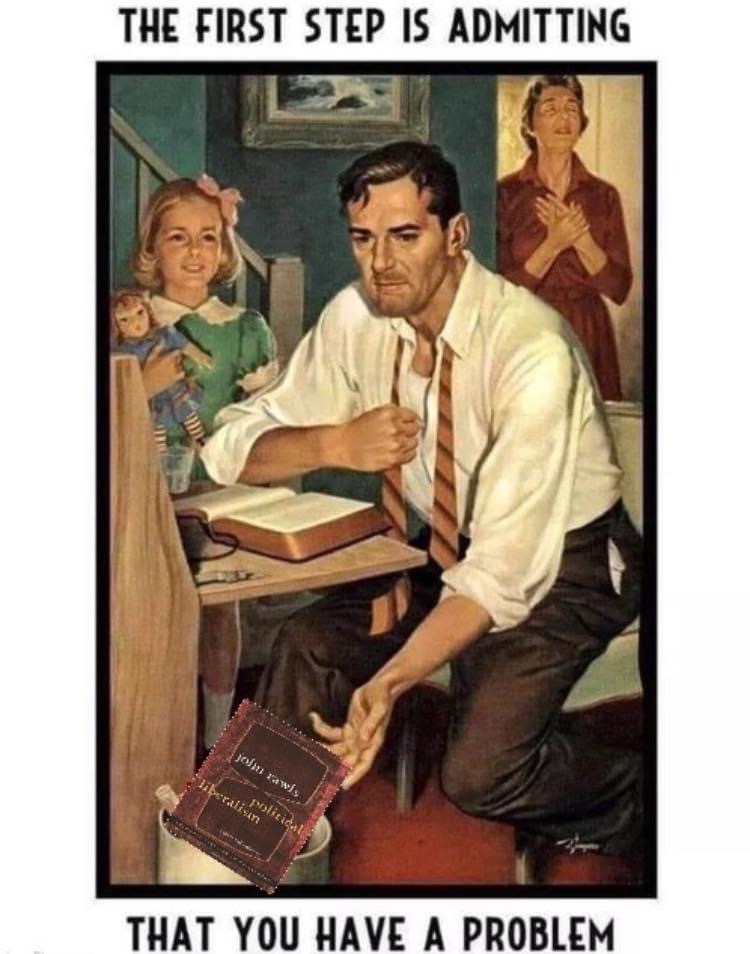
Avoid *slavish* Rawlsianism
Indeed, after studying Rawls with Jerry for so many years, I came away with the sense that Political Liberalism is the more enduring and insightful work. Jerry often encouraged his students to rethink common narratives of research in the profession, and I think he was pleased when he helped others see through standard narratives because they were misleading and narrowed our ability to uncover new insight.[iv]
It was from these convictions that Jerry began to develop his own brand of “PPE” theorizing, bringing together philosophy, political science, and economics into a comprehensive study of social order. (Note that Jerry’s PhD is from Pittsburgh in Political Science, not Philosophy; have you ever known a better philosopher who lacked a PhD in the area?) And Jerry included morality in the idea of social order. Morality is a kind of tool that human beings had evolved to use to solve critical social problems and enable cooperation. Of course, morality was not developed self-consciously to solve these problems, like the wheel. It arrived long before and less consciously than that. But moral philosophy is at its best the study of moral order; and that necessitated going beyond philosophy into many other fields. This was why Jerry challenged his students to master interdisciplinary tools, in some cases to an extreme degree; in recent years, he has had his students complete complex proofs in social choice theory; and a few of his present students have been writing their own computer programs to generate agent-based models of social cooperation. With each passing year, his students grew in strength and intellectual reach.

True for his students!
III. Ideology vs Relationship in Jerry’s Later Work (2010-2020)
With time, Jerry would continue to contrast the interpersonal, known, and free with the impersonal, unknown, and authoritarian. Jerry rejects a certain “man of system” approach to other human beings. This conviction manifested most clearly in his magnum opus, The Order of Public Reason, published in 2011. That book begins with the recognition that there is a unique domain of the normative that he called, following Kurt Baier and Peter Strawson, “social morality”—the recognized rules of social life that we use to direct each other’s conduct. He then added that our social morality can be authoritarian and oppressive, or it can be turned to serve as an extension of freedom and human relationships. He there developed a complex deontological moral psychology based on the most sophisticated research available in order to show that a large-scale, diverse society could have a truly non-authoritarian, free, and egalitarian morality.
Over the fifteen years since Justificatory Liberalism was published, Jerry had soured on traditional social contract theory, coming to believe that it was inherently indeterminate in that the social contract could not secure unanimous agreement on principles of justice and legitimacy. All worthwhile social contract theories must acknowledge the possibility of multiple solutions to our problems. Indeterminacy was inevitable.
The idea to embrace indeterminacy led to further insights. First, we would have to look to real social processes to help choose among the set of possible solutions. But which processes? Jerry argued that he had, in the past, relied too much on the democratic state to select among sets of laws and policies. We must now turn to Hume and Hayek to recognize that much of our moral and political order is the product of social evolution, and that our contractualist social morality could not be given a complete rational reconstruction. This was one of Hayek’s great insights – that much of our social order is spontaneous, if not the vast majority of it – and that its true rationale is often unknowable. Indeed, an attempt to impose a rational intellectual structure on society would risk destroying it. That was the great danger of socialism for Hayek; and that was the great danger of all political ideologies for Jerry, including libertarianism.
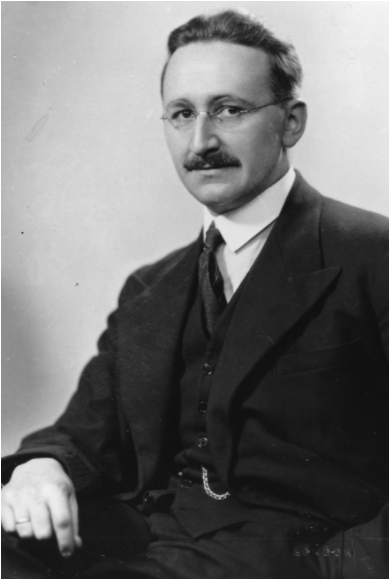
Jerry wasn’t quite a Hayekian; but by 2020, he was awfully close.
In the same book, Jerry fully embraced diverse and pluralistic reasoning, even allowing religious reasoning to play an intimate part of social life. Like Rawls, he did not think the free use of practical reason would lead to agreement on the good, though he had much more scientifically-informed reasons for reaching that conclusion. Indeed, in Contemporary Theories of Liberalism, he described the public reason project as a post-Enlightenment project, which requires that we admit that the exercise of pure reason will not solve the central problems of social life because we will limit ourselves to fewer opportunities to fruitfully cooperate and learn from one another. Political philosophers must embrace diverse reasoning and diverse perspectives, and expect agreement to be elusive. Yet diversity was not a danger to be contained, but a resource that can expand the value in our lives and our capacity to live together well. This work led to his New Diversity Theory, an idea he was still working out when he died. The New Diversity Theory was an attempt to use diversity as a resource to be leveraged as an engine for discovery and progress.
Jerry’s preoccupation with the dangers of ideology and homogeneous reasoning led to his next work, The Tyranny of the Ideal, published in 2016, where he offered an extensive argument that ideal theory in political philosophy can’t perform the roles philosophers traditionally assign to it. This is because we are cognitively incapable of determining how to arrive at our ideals unless we have an open society where people committed to diverse ideals can engage in experimentation. Jerry once told me he saw Mill as a “Saint” and this book was indeed his most Millian work. I’ll admit that the book depressed me, because I am a recovering ideology addict; I had to face the fact that I was guilty of the sin of epistemic arrogance that Jerry identified therein.
IV. Growing Up and Calming Down
But Jerry did not want us to suffer, nor did he want us to be sad. He wanted to bring us all down to Earth, to grow up a bit, to focus on the real relationships in our lives that mattered, the concrete relations of love, friendship, and trust that provided the real, stable meaning and worth in our lives. This was part of the fact that he enjoyed sharing his social life with his much younger graduate students than with well-established and high-status members of his field. He found us fresher, less ideological, and more energetic. We were all so honored that he found so much value in his friendships with us.
Just a few weeks ago, I received a draft of his next book, The Open Society and Its Complexities. In the manuscript, Jerry argues that the order of open societies is fundamentally complex, and not just complicated. A complicated system has many parts, but a complex system adds relations of causal feedback between those parts. This makes complex systems hard to understand and harder to predict. How, then, can friends of open societies ever hope to make sense of how to justify its central institutions like democracy and the market? You will one day be able to read the book to learn the answer.
We can see a central theme of Jerry’s work, running across decades of thought. Jerry often stressed the importance of peace and compromise.[v] But his love of truth and hatred of ideology made him a man of great principle and conviction. While he told others to be less confident in their attempts to remake society, what I call his “anti-ideal ideal” animated his personal life. Again, Jerry chose his friends carefully, and invested heavily when the opportunity arose. He was also a man who loved the simple things in life—a glass of wine, a baseball game, an old movie, a Wallace and Gromit film, a meal in New Orleans with students, and above all his wife and his daughter. Jerry hoped that humanity would come to see that what so many people find small and worthless actually makes life worthwhile. They are surely worth far more than the ridiculous castles in the air that we kill and die for.
Allow me to put a finer point on this. As an offshoot of his project, and in line with my own interest in religion, I had written an essay that tried to explore why all or nearly all complex societies have civil religion. Why all the pomp and circumstance, the coronations and inaugurations, the grand speeches and public prayers? Why ritual and song and dance? Why hero worship and the persecution of hated out-group members? I had come to wonder whether civil religion was an ineliminable feature of complex social orders.
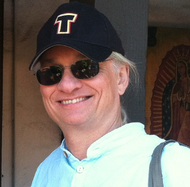
Tucson Toros; he chose this picture for an interview with the New York Times.
Jerry had mixed feelings about the paper, in part because he didn’t want to believe that these practices were necessary to keep social order going, given the dangers they posed. In his response to me, he postulated an alternative civil religion for the American open society:
Baseball
Jerry knew that we evolved as partly tribal beings, but hoped that we could channel our internecine tribalism into harmless bread and circuses, and then lead the best lives available to us. Jerry once told me that we are “just monkeys with bells and whistles” and bread and circuses and good relationships were the best we could do, for now. This was not something to lament, but something to embrace. Our bread and circuses are wonderful things, to be cherished, not downplayed.
When I think of him, I’ll recall this line from Gandalf in the movie adaptation of The Hobbit:
“Saruman believes that it is only great power that can hold evil in check, but that is not what I have found. I found it is the small things, everyday deeds of ordinary folk that keeps the darkness at bay. Simple acts of kindness and love.”
Jerry warned us all, in both his work and personal life, that great concentrations of power, and the carefully spun political ideologies that legitimized them, will not keep the darkness at bay. They are part of the darkness. We must respond by appreciating the local and tangible, our relationships of love and friendship, the personal pursuit of truth. These things are our great weapons. “Bread and circuses” are normally used to refer to the trivial, but for Jerry they referred to what’s great. Baseball and beer. An old movie or novel. Wine with his wife, drinks with his daughter, food with his friends.
Jerry Gaus was my friend and teacher. His life was a message from which we can all profit, no matter what we believe. May we all acquire a bit more humility, and pay a bit more attention to the real, tangible relationships in our lives. I will honor Jerry by focusing more on those around me, loving my wife and my kids, slowing down to share moments with students and colleagues, correcting my own tendencies towards intellectual arrogance, and recommitting to pursuing the truth above all.
Goodbye, Jerry. I will miss you.
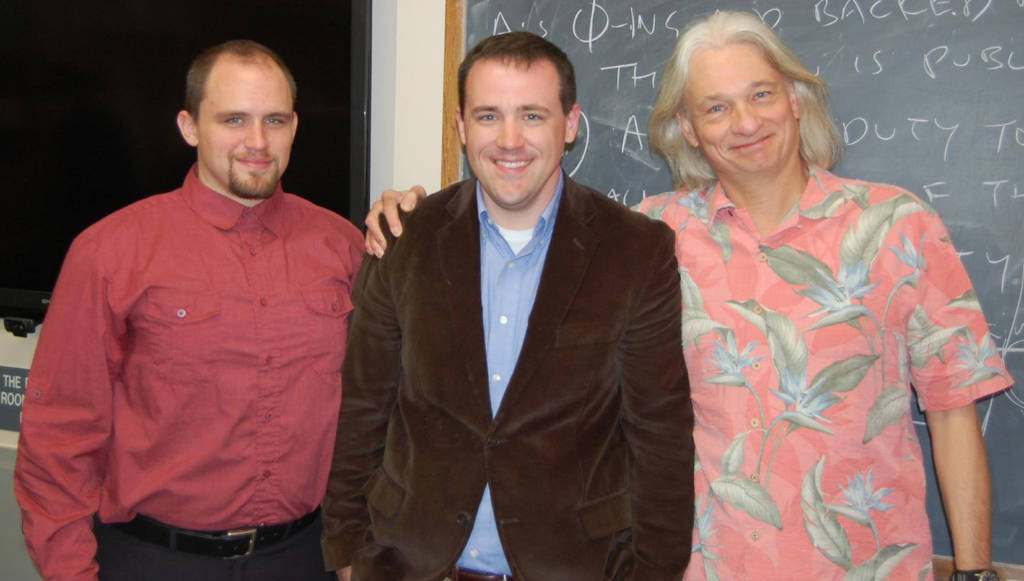
Me, Chad, and Jerry at a 2014 conference on my first book.
—–
[i] Jerry did not greet the recent revival of Aristotelian virtue ethics with much enthusiasm, a point he noted in The Order of Public Reason. He thought teleological ethical theories miss critical aspects of moral life and moral psychology, so much so that they could not serve as a public basis for organizing large-scale social orders, the problem with which he was most concerned. The move back to Aristotle was likely to lead authoritarianism and inability of diverse persons to live together well.
[ii] https://www.jstor.org/stable/2381732
[iii] Though here is a nice review: https://www.jstor.org/stable/2659941
[iv] Jerry had an ongoing commitment to ensuring commonly ignored figures were given their due. This extended to largely forgotten figures like T.H. Green and Bernard Bosanquet, to authors whose names are known but who are seldom read, like Stanley Benn (a close friend of his), Kurt Baier, Richard Hare, and Alan Gewirth, and social scientists whose work had philosophical implications, like Cristina Bicchieri and Elinor Ostrom.
[v] Though lately I think he thought I’d been getting a bit too impressed by peace and wrote a paper emphasizing the importance of social conflict for social advancement. That’s one theme in The Open Society and Its Complexities.


Add Comment